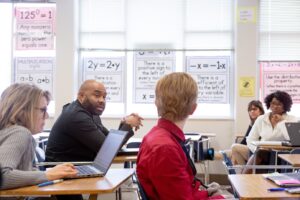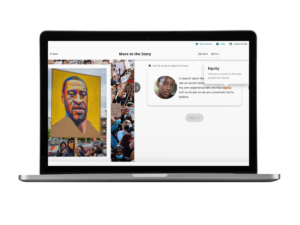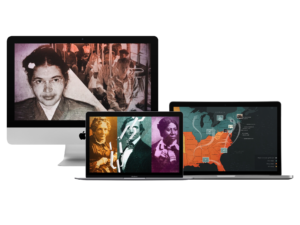As each birthday gets celebrated, I keep thinking that THIS will be the year that I have become wise. I will be able to offer valuable and nurturing guidance to those younger than me, who have not had my years of experience. But as my 65th birthday draws nearer, I’m FINALLY realizing that I really don’t know it all! Although I can provide perspective on some things and counsel on others, there are many kinds of knowledge, experiences, and skills that I have never had. Far from me being the all-knowing mentor to others, I find that I need mentoring myself, in many areas.
In higher education and in industry, professional developers have discovered this truth: everyone can learn something from someone else, and everyone has something to share with others. This model of professional learning is called “mutual mentoring”.
The technical definition is “a non-hierarchical developmental relationship based upon mutual reciprocity between two individuals”, which basically means a mentoring relationship where both parties act as mentor and mentee, recognizing that there is something to learn from each other. What is Mutual Mentoring? And it’s benefits?
However, mutual mentoring need not be limited to just two people. It can include several people who have respect for each other and are inclined to both providing and receiving help.
The Mutual Mentoring Guide, published by U of Mass, Amherst, puts it this way:
In recent years, however, the literature on professional development has indicated the emergence of new, more flexible approaches to mentoring in which no single person is expected to possess the expertise of many. Early career faculty are now encouraged to seek out “multiple mentors” (de Janasz & Sullivan, 2004), “constellations” of mentors (van Emmerik, 2004), “developmental networks” (Dobrow et al., 2012), or a “portfolio” of mentors (Higgins & Kram, 2001) who address a variety of career competencies. Based on these findings and our own needs assessment data (Sorcinelli & Yun, 2007, 2009) we developed a flexible, network-based model of support called “Mutual Mentoring” in which faculty work with multiple mentors who provide support in their respective areas of expertise, rather than a single mentor who is less likely to be able to address the wide variety of opportunities and challenges faced by diverse scholars in a modern academic career.
The rewards of mutual mentoring for K-12 teachers could be game-changers. No matter where you are in your professional career, YOU bring something to the table. No longer is mentoring the sole responsibility of those with the longest years in the job. Everyone grows when everyone is open to whatever it is that others can offer.
By framing mentoring as a relationship based on two-way communication, equity, and acceptance, professional learning takes on a new energy. New teachers can feel encouraged to try what they learned in academia, while experienced teachers can temper experimentation with insights into student learning. Experienced teachers can pass along the successful techniques they have used, while new teachers can provide skeptical questioning of long-held assumptions.

When mentoring is approached as a fluid relationship among a group of professionals, it is more sustainable than having a small group of senior mentors responsible for many mentees. When one person is too busy, another is available. Learning happens more frequently, maintaining professional growth over time—continual growth at its best!
Mutual mentored professional growth can be enhanced with the use of asynchronous tools, to help teachers mentor each other through the use of classroom artifacts. On #GoOpenVA, we encourage this type of mentoring by contributors. Providing not just your lesson plans, but the reasoning behind why you taught this topic this way, and how you found it worked best for your students—these are the invaluable lessons provided by any educational mentor. And then by encouraging your mentoring partners to take your original work and enhance it, you give them agency to grow through your example. They, in turn, broaden your perspective.
This process is called remixing, or customization, or adaptation. On #GoOpenVA, you can easily do this if a lesson has been added to the system through our online editing tool, Open Author. All you need do is click on the REMIX button right there on the resource, and start your changes. A new lesson is created and linked to the original. In this way, anyone can view the original and remixed lesson, comparing how one might be better for their own purposes than the other. And of course, remixes are not limited to just one. Many remixes can be made of the same resource, and all linked together. One teacher may address the needs of students who don’t read on grade level, another might link a video resource she/he is already using on the same topic, and yet another might include a PBL approach to the topic. This enriches the original lesson. and everyone who discovers it on #GoOpenVA. In the end, mentoring each other is achieved through the sharing on these documents, which represent the thinking, experiences, and skills of many different educators.
To learn more about Creating and Remixing on #GoOpenVA, visit the #GoOpenVA Help Hub. Remember that you can view/download all the resources on #GoOpenVA anytime, but if you want to become part of a community of mutual mentors, you need to become a registered user (see Getting Access to #GoOpenVA for instructions on how to easily join this VDOE-supported resource).
Photo used under a Creative Commons license, BY-NC
Written by Jean Weller. Jean is the Teaching and Learning Technology Integration Specialist at the Virginia Department of Education. She is also a member of the VSTE Board of Directors, representing the DOE.

 Jean Weller, VSTE Board Member and VDOE Technology Integration Specialist, leads the #GoOpenVA initiative in Virginia. This collaborative initiative enables educators and others throughout Virginia to create, share, and access openly-licensed educational resources (OER, also known as open education resources). OER are free digital materials that can be used or modified to adjust to student needs; they are openly-licensed unhampered by many traditional copyright limitations.
Jean Weller, VSTE Board Member and VDOE Technology Integration Specialist, leads the #GoOpenVA initiative in Virginia. This collaborative initiative enables educators and others throughout Virginia to create, share, and access openly-licensed educational resources (OER, also known as open education resources). OER are free digital materials that can be used or modified to adjust to student needs; they are openly-licensed unhampered by many traditional copyright limitations.



